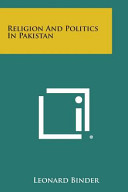

Most ebook files are in PDF format, so you can easily read them using various software such as Foxit Reader or directly on the Google Chrome browser.
Some ebook files are released by publishers in other formats such as .awz, .mobi, .epub, .fb2, etc. You may need to install specific software to read these formats on mobile/PC, such as Calibre.
Please read the tutorial at this link: https://ebookbell.com/faq
We offer FREE conversion to the popular formats you request; however, this may take some time. Therefore, right after payment, please email us, and we will try to provide the service as quickly as possible.
For some exceptional file formats or broken links (if any), please refrain from opening any disputes. Instead, email us first, and we will try to assist within a maximum of 6 hours.
EbookBell Team

0.0
0 reviewsThis study is primarily concerned with the conflicting theories of the nature of an Islamic state, the manner in which they were stated, and the process by which they were altered.
Attention has been concentrated upon the views of those who actually participated, whether directly or indirectly, in drawing up a constitution for Pakistan. The views of the ‘ulamâ’, of the politicians, and of an organization known as the Jama‘at-i- Islâmi were the only ones that have been continually effective from 1947 to the present.
The views of the civil service and the military have only recently been brought to bear with some force upon these issues. Popular writers have had no success in calling attention to their ideas of an Islamic state, and ordinary laymen have been completely ignored.
Though the overwhelming majority of Pakistanis agree that Pakistan ought to have an Islamic constitution, the difficulty in the communication of ideas has prevented any particular theory from gaining ascendancy with the public. The resultant situation both encouraged and required compromise on the part of the religious interests.
The politicians were, however, deeply divided on the issue of the distribution of legislative power among the provinces and on the issue of provincial autonomy. In order to strengthen their own position various groups of politicians were at least willing, if not compelled, to compromise with the ‘ulamâ’.
About the Author
Leonard Binder was an American political scientist. He was a distinguished professor of political science and the former director of the Near East Center at the University of California, Los Angeles. Binder was also Chair of the Political Science Departments of UCLA and the University of Chicago.